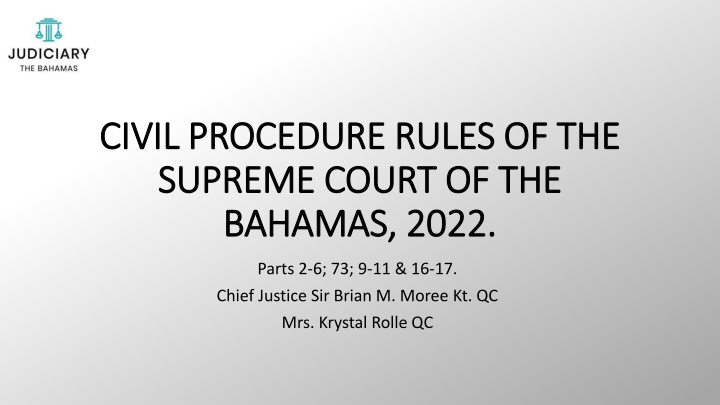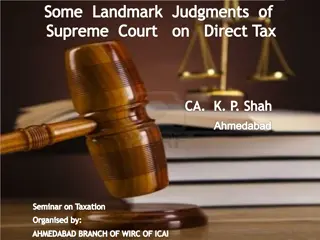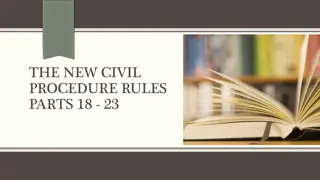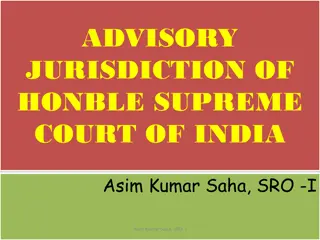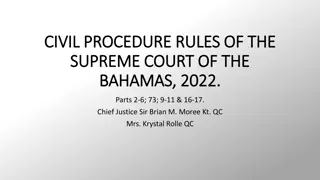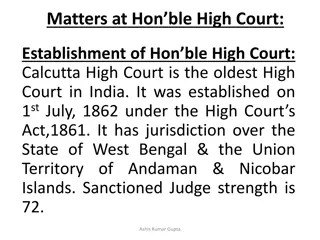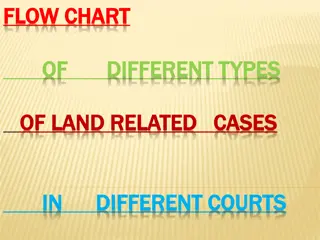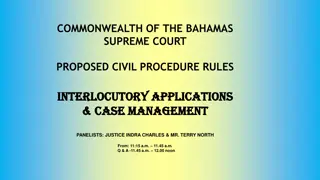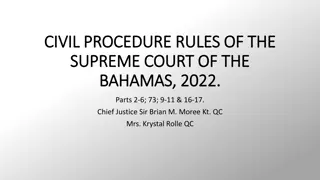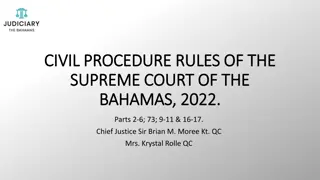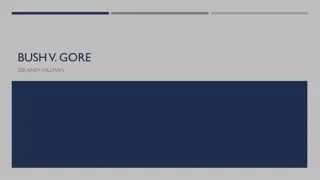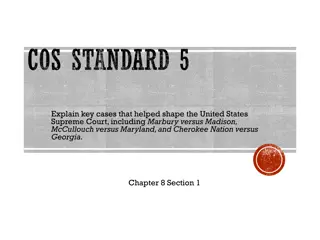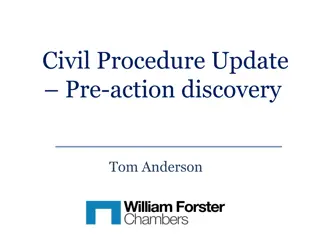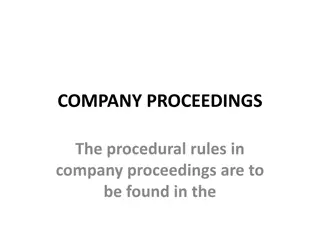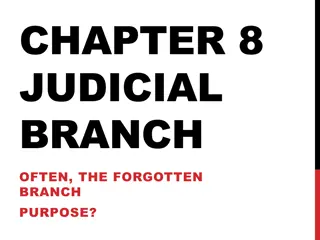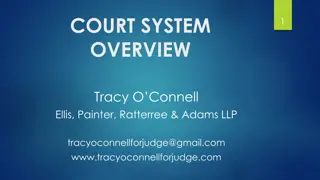Civil Procedure Rules of the Supreme Court of The Bahamas, 2022
The Civil Procedure Rules of the Supreme Court of The Bahamas, 2022 detail the application of CPR to civil proceedings, highlighting exceptions, the Woolf Reforms, and key provisions such as active case management and the overriding objective. The rules also address proceedings commenced before the new rules came into effect and emphasize the court's discretion in considering the principles outlined within the rules.
Download Presentation

Please find below an Image/Link to download the presentation.
The content on the website is provided AS IS for your information and personal use only. It may not be sold, licensed, or shared on other websites without obtaining consent from the author.If you encounter any issues during the download, it is possible that the publisher has removed the file from their server.
You are allowed to download the files provided on this website for personal or commercial use, subject to the condition that they are used lawfully. All files are the property of their respective owners.
The content on the website is provided AS IS for your information and personal use only. It may not be sold, licensed, or shared on other websites without obtaining consent from the author.
E N D
Presentation Transcript
CIVIL PROCEDURE RULES OF THE CIVIL PROCEDURE RULES OF THE SUPREME COURT OF THE SUPREME COURT OF THE BAHAMAS, 2022. BAHAMAS, 2022. Parts 2-6; 73; 9-11 & 16-17. Chief Justice Sir Brian M. Moree Kt. QC Mrs. Krystal Rolle QC
The Woolf Reforms The Woolf Reforms The [CPR] ..called for a new approach to civil justice, a reform of litigation culture among legal practitioners, those they represent, and the judiciary. The change in litigation culture was achieved through three innovations: the introduction of active case management, the introduction of the overriding objective, and the imposition of a duty on litigants and their representatives to assist the court in furthering the overriding objective.
APPLICATION OF CPR APPLICATION OF CPR Apply to all civil proceedings in the S/C except: (a) bankruptcy and insolvency proceedings (including winding up of companies); (b) family proceedings except proceedings under the Child Protection Act; (c) non-contentious probate proceedings; and (d) any other proceedings in the Court instituted under any enactment, in so far as rules made under that enactment regulate those proceedings; and
APPLICATION OF CPR APPLICATION OF CPR (e) proceedings started before the new Rules come into effect where a trial date is fixed unless that date is adjourned. In such proceedings, an application to adjourn a trial date is to be treated as a pre-trial review and the new Rules apply from the date that such application is heard. Where a trial date has not been fixed in proceedings that were started before the new Rules come into effect (i) the Claimant must obtain a date for a case management conference under Part 27 after a defence has been filed and give all parties at least 28 days notice of the conference; and (ii) the new Rules apply from the date of the case management conference given under paragraph (i).
PART 73.4 PART 73.4 Where in proceedings commenced before the Rules come into effect the court has to exercise its discretion, it may take into account the principles set out in these Rules and, in particular Parts 1 (the Overriding Objective) and Part 25 (Objective of Case Management).
TERMINOLOGY TERMINOLOGY Existing Rules New CPR Statement of case claim form, statement of claim, defence, counterclaim, additional claim form or defence or a reply and further information under Part 34 Claimant; Claim Form: Fixed Date Claim Form or Standard Claim Form. Originating Application; Further Information; Pleadings; Plaintiff; Writ; Originating Summons; Further & Better Particulars / Interrogatories; Memorandum of Appearance; Ex Parte Acknowledgment of Service; Without notice
PARTS 2 PARTS 2 - - 3 3 Masters CPR 2.4 (1) & (3). Remote court hearings audio, video & paper hearings CPR 2.6 (3) & (4) Computation of time Part 3 Electronic filing CPR 3.3 (2) & CPR 3.4 Electronic seal CPR 3.5(2) (b) Address for service 3.7(2). Statement of case must contain an address for service. If an attorney, the name of the person who is dealing with the matter, telephone number and email address. Statement of truth CPR 3.8. Every statement of case to be verified by a statement of truth by the party personally unless it is impracticable to do so. In that case, it must be given by the attorney. Failure to give a statement of truth may lead to the statement of case being struck out.
PARTS 4 PARTS 4 - - 5 5 CPR 4.2 & 4.5 Practice Directions and Practice Guides. Must be followed unless there is good reason for not doing so. Subject to costs order and case management order if fail to follow without good reason. Service of Claim form within the jurisdiction: CPR 5.1 general rule is personal service of claim form. Service by email governed by Practice Direction. CPR 5.1(2). CPR 5.2 general rule is that claim form must be served with statement of claim unless the court gives permission to serve it separately or the claim form includes all the following information: a) a short description of the nature of the claim; b) any remedy that the claimant seeks; c) an address for service; d) relevant details of claims, if any, of aggravated damages/exemplary damages, interest and, if applicable, the representative capacity of the claimant;
PART 5 PART 5 e) a statement of truth; f) a statement of all the relevant facts on which the claimant relies; g) identifies any document known to the claimant which the claimant considers to be necessary to his or her case. h) if the claimant seeks recovery of any property, the claimant s estimate of the value of that property; and i) if it is a PI case, the details required under Part 8.9.
PART 5 PART 5 In a case of urgency when it is not practicable to include above information or obtain the permission of the court to serve it separately, a claim form can be issued and served without a statement of claim provided that the claimant - (a) certifies in writing that the issue and service of the claim form is a matter of urgency, stating why; and (b) serves a copy of the - (i) certificate; and (ii) an application for permission; with the claim form. Unless the court otherwise orders, claimant can take no further steps in the action pending getting permission to serve the claim form without the statement of claim.
PART 5 PART 5 Permission by court only given if it is satisfied that a relevant limitation period is or was about to expire and the claimant has obtained legal advice relating to the claim for the first time within the 28 days prior to the date that the claimant wishes to file the claim; or the claim form requires or required to be issued as a matter of urgency and that it is or was not practicable for the claimant to prepare a statement of claim. Application may be made without notice. Any order giving permission for the claim form to be filed and served without a statement of claim must state a date by which the Statement of Claim must be filed and served which cannot be more than 28 days from the date of the order giving permission.
PART 5 PART 5 Unless the statement of claim is contained in the claim form, service of the claim form must be accompanied by - (a) unless dispensed with, the statement of claim; or (b) if the Rules require, an affidavit or other document; (c) a copy of any order that may have been made; and (d) a copy of any order or application dispensing with the statement of claim;
PART 5 PART 5 Affidavit of Service of claim form must state: (a) the date and time of service; (b) the precise place or address at which it was served; (c) the precise manner by which the person on whom the claim form was served was identified; (d) precisely how the claim form was served. If the person served was identified by another person, there must also be filed where practicable an affidavit by that person- (a) proving the identification of the person served; and (b) stating how the maker of the affidavit was able to identify the person served. If the server identified the person to be served by means of a photograph or description there must also be filed an affidavit by a person - (a) verifying the description or photograph as being of the person intended to be served; and (b) stating how the maker of the affidavit is able to verify the description or photograph as being of the person intended to be served.
PART 5 PART 5 If an attorney is authorised to accept service of the claim form on behalf of a party and has notified the claimant in writing that he or she is so authorised the claim form must be served on that attorney. There are specific provisions for serving claim form on companies, partnerships, body corporate and minors or patients. Proof of postal service of claim form is by affidavit of person posting the claim form and must exhibit a copy of the claim form and state the address to which it was sent.
PART 5 PART 5 Service by electronic means of a claim form is proved by an affidavit of service by the person responsible for transmitting the claim form to the person to be served. Must exhibit a copy of (a) the document served; (b) any cover sheet or email to that document; (c) the transmission record; and (d) proof of electronic service of the document, and must state the (i) electronic means by which the document was served; (ii) e-mail address or FAX number to which the document was transmitted; and (iii) date and time of the transmission. Electronic confirmation of delivery may be treated as proof of service for a document that is served electronically and may include a written e-mail response or a read receipt.
PART 5 PART 5 SUBSTITUTUED SERVICE SUBSTITUTUED SERVICE Must take reasonable steps to personally serve the claim form. If unable to serve personally, the claim form can be served through an alternative method. No leave or permission required. Where that occurs and court is asked to take any step (including the filing of a Default Judgment) on the basis of service, the party who served the claim form must file an affidavit proving that it was impracticable to personally serve the defendant and that the method of service was sufficient to enable the defendant to ascertain the contents of the claim form.
PART 5 PART 5 SUBSTITUTUED SERVICE SUBSTITUTUED SERVICE The affidavit must - (a) exhibit a copy of the documents served; (b) give details of the attempts made to personally serve the defendant; (c) give details of the alternative method of service used; (d) show that - (i) the person intended to be served was able to ascertain the contents of the documents; or (ii) it is likely that he or she would have been able to do so; and (e) state the time when the person served was or was likely to have been in a position to ascertain the contents of the documents. Judge or a registrar must consider the evidence and endorse on the affidavit whether it satisfactorily proves service. If not satisfied, a hearing date must be given to consider making an order for service by a specified method and give at least 7 days notice to the claimant or the claimant s attorney. Hearing is without notice and must be supported by an affidavit.
PART 5 PART 5 Provisions for service of claim form (i) by contractually agreed method; (ii) on agent of principal who is out of the jurisdiction; and (iii) for possession of vacant land CPR 5.16 - 5.18. Deemed date of service Post - 28 days after posting; Registered Post - 21 days after the date indicated on the Post Office or courier receipt; Leaving document at a permitted address - the day after leaving the document; Other electronic method of service 4:00 p.m. on the same day of transmission or if transmission is after 4:00 p.m. the following business day at 9:00 a.m. Any document served after 4:00 p.m. on a business day or on a day other than a business day is deemed to be served on the next business day.
PART 5 PART 5 If served on the attorney of a party who certifies that he or she accepts service on behalf of the defendant, service deemed to be on the date on which the attorney certifies acceptance of service. If an acknowledgment of service is filed, whether or not the claim form has been duly served, service deemed to be: (a) the date of filing the acknowledgment of service; or (b) (if earlier) the date shown on the acknowledgment of service for receipt of the claim form. Can prove by affidavit that service was in fact effected on a date earlier than the date on which it is deemed to be effected.
PART 6 PART 6 SERVICE OF OTHER DOCUMENTS SERVICE OF OTHER DOCUMENTS Not applicable to civil proceedings against the Crown CPR 65.3(1). Any means of service under Part 5; Leaving it at any address for service given by the party to be served; or Other means of electronic communication if permitted by a practice direction; unless it is not allowed by the rules or the court orders otherwise. Address for service Documents must be delivered or, if allowed, sent by electronic communication or posted to a party at any address for service within the jurisdiction given by that party.
PART 6 PART 6 SERVICE OF OTHER DOCUMENTS SERVICE OF OTHER DOCUMENTS If no address within the jurisdiction given by a party to be served then can be served: by leaving it - (a) in the case of a firm or partnership either (i) at the principal or last known address of the firm or partnership or any place where the firm or partnership carries on business and which has a real connection with the claim; or (ii) the usual or last known place of residence of one of the partners; (b) in the case of an individual that person s usual or last known place of residence; (c) in the case of a proprietor of a business that person s (i) usual or last known place of residence; or (ii) place of business or last known place of business; or (d) at the business address of any attorney who purports to act for the party in the proceedings. The provisions of Part 5 may be applied to such a document as if it were a claim form.
PART 6 PART 6 DISPENSING WITH SERVICE DISPENSING WITH SERVICE Court may dispense with service if appropriate to do so on an application without notice supported by affidavit. Service on AG by leaving it at that office of the AG unless enactment or rule provides otherwise.
PART 17 PART 17 Interim remedies and relief CPR 17.1 lists 18 interim remedies ( not an exhaustive list) which can be granted. Includes: (i) an interim declaration; (ii) an interim injunction; (iii) an order directing a party to prepare and file accounts relating to the dispute; (iv) an order directing a party to provide information about the location of relevant property or assets or to provide information about relevant property or assets which are or may be the subject of an application for a freezing order; (v) a freezing order restraining a party from (a) dealing with any asset whether located within the jurisdiction or not; or (b) removing from the jurisdiction assets located there a Mareva injunction ; (vi) a search order requiring a party to admit another party to premises for the purpose of preserving evidence, etc. an Anton Pillar Order ;
PART 17 PART 17 Interim remedy can be granted whether or not there has been a claim for a final remedy of that kind. Re. an interim injunction, a search order, a freezing order, an order authorising a person to enter any land or building for the purpose of carrying out an order under rule 17.1(1)(h), and an order for the detention, custody or preservation of relevant property. - application on notice to be made on 3 days notice to the respondent; - application without notice. Court may make order for a period of not more than 28 days if it is satisfied that in a case of urgency no notice is possible or that to give notice would defeat the purpose of the application. On granting an order without notice the court must fix a date for further consideration of the application and fix a date (which may be later than the date for further consideration) on which the interim order will terminate unless a further order is made on the further consideration of the application.
PART 17 PART 17 When order without Notice is made, applicant must, not less than 7 days before the date fixed for further consideration of the application, serve the respondent personally with - (a) the application for an interim order; (b) the evidence in support of the application; (c) a copy of the transcript of the hearing, if any, or if there is no such transcript a copy of Counsel s note of the hearing; (d) a copy of any written submissions or skeleton arguments used at the hearing; (e) any interim order made without notice; and (f) notice of the date and time on which the court will further consider the application.
PART 17 PART 17 Order for an interim remedy may be made at any time, including after judgment and before a claim has been filed if the matter is urgent or it is otherwise necessary to do so in the interests of justice on an undertaking from the claimant to file and serve a claim form by a specified date. Unless the court otherwise orders, a defendant may not apply for any of the interim remedy orders before filing an acknowledgment of service. Application for an interim remedy must be supported by affidavit unless the court otherwise orders. Where it is not practicable to produce evidence on affidavit then the application may be heard on the basis of either information given orally to the court with an undertaking to file an affidavit within a specified date setting out the oral information or evidence given by witness statement subject to filing affidavit at a later date. Evidence in support of an application made without giving notice must state the reasons why notice has not been given.
PART 17 PART 17 Special provisions relating to search orders CPR 17.6 17.13. Highlights - can be made before or after proceedings filed; - can be made to secure or preserve evidence and require a respondent to permit persons to enter premises for the purpose of securing the preservation of evidence. - made only when applicant seeking the order has a strong prima facie case on an accrued cause of action and (i) the potential or actual loss or damage to the applicant will be serious if the search order is not made and (ii) there is sufficient evidence that the respondent possesses relevant evidentiary material and there is a real possibility that the respondent might destroy such material or cause it to be unavailable for use in evidence in a proceeding or anticipated proceeding before the court.
PART 17 PART 17 - Order may permit identified persons (but not the applicant) to enter specified premised to carry out search order including searching for, inspecting, or removing a listed or described thing and making or obtaining a record of it or information contained in it - May allow other named or described persons, including computer specialists not associated with either the applicant or the respondent, to take and retain in their custody, or copy, any described thing or information and - May provide that no information about the order to be disclosed for up to 3 working days after the date on which the order was served, except for the purposes of obtaining legal advice or legal representation. - Order must require undertakings from the applicant.
PART 17 PART 17 - Court must appoint one or more independent attorneys to supervise the execution of the order, and to do whatever things in relation to the order the court considers appropriate. Special provisions relating to interim payments CPR 17.14 17.17. Highlights - Cannot apply before the end of the period for entering an acknowledgment of service applicable to the defendant against whom the application is made. - Can make more than one application for an order for an interim payment. - Notice of application must be served at least 14 days before the hearing and supported by affidavit. - Must exhibit to the affidavit any documentary evidence relied on by the claimant. - state the claimant s assessment of the amount of damages or other monetary judgment that are likely to be awarded.
PART 17 PART 17 - Affidavit by respondent or by the claimant in reply must be filed and served on every other party to the application at least 7 days before the hearing of the application. - Order may provide for interim payment to be made in one sum or by instalments. - Order only made if conditions in CPR 17.15 are satisfied. - Order not to be for more than a reasonable proportion of the likely amount of the final judgment after considering contributory negligence (where applicable) and any relevant set-off or counterclaim. - On application for interim payment, court can exercise any of its case management powers including giving directions for an early trial.
